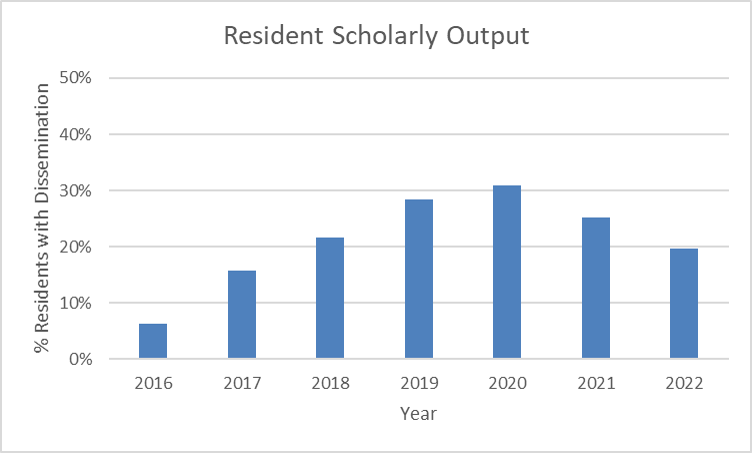Medical Education: Resident
Medical Education 14: Resident 5
497 - Research Track – A Method to Enhance Resident Scholarly Output
Publication Number: 497.422

Ross E. Myers, MD (he/him/his)
Professor
UH Rainbow Babies & Children's Hospital
Case Western Reserve University / Rainbow Babies and Children's Hospital
Cleveland, Ohio, United States
Presenting Author(s)
Background:
The importance of research has been recognized by both the AAP and ACGME, with both organizations recommending training in research methodology for residents. Few residents at our institution participated in scholarly pursuits that led to dissemination of findings outside the institution.
Objective: Design, implement, and evaluate a research track for pediatric residents with a primary goal of increasing the scholarly output of residents.
Design/Methods: A unique track designed to increase resident exposure to and experience with research was created and implemented at our large, academic pediatric residency program in the 2016-2017 academic year. This optional track includes semi-annual meetings with the track director who is a faculty member with knowledge of the type of research done throughout the department of pediatrics, facilitated pairing of residents with research faculty mentors, and an enhanced curriculum on topics important to research and scholarship. Scholarly output, as measured by peer-reviewed presentations and manuscript publications disseminated beyond the walls of our institution, was analyzed using z-tests for proportion differences to compare the percent of residents disseminating each year to the year prior to instituting the research track. Data was collected annually from categorical pediatric and medicine-pediatric residents from 2016-2022.
Results: Scholarly output increased incrementally from 6.25% in 2016 to a max of 31% of residents in 2020 (p< 0.05). Percent of residents with scholarly output has decreased since 2020, down to 19.6% in 2022 which is still a significant increase from before track implementation (p< 0.05).
Conclusion(s): Instituting a research track in our pediatric residency program led to a statistically significant increase in scholarly output over the period of study. A decrease in scholarly output has been noted over the last two years which we hypothesize is related to the COVID-19 pandemic.
